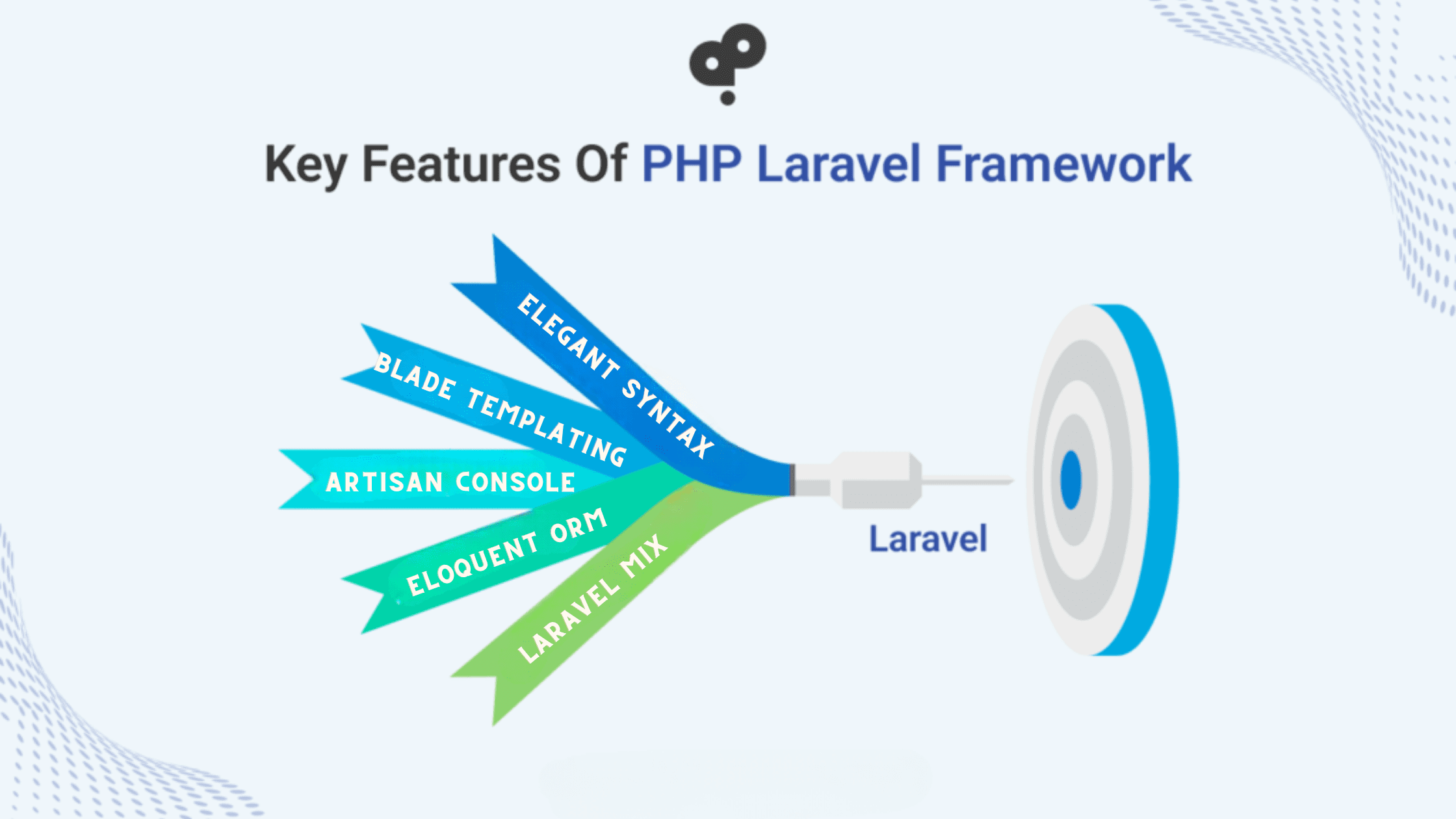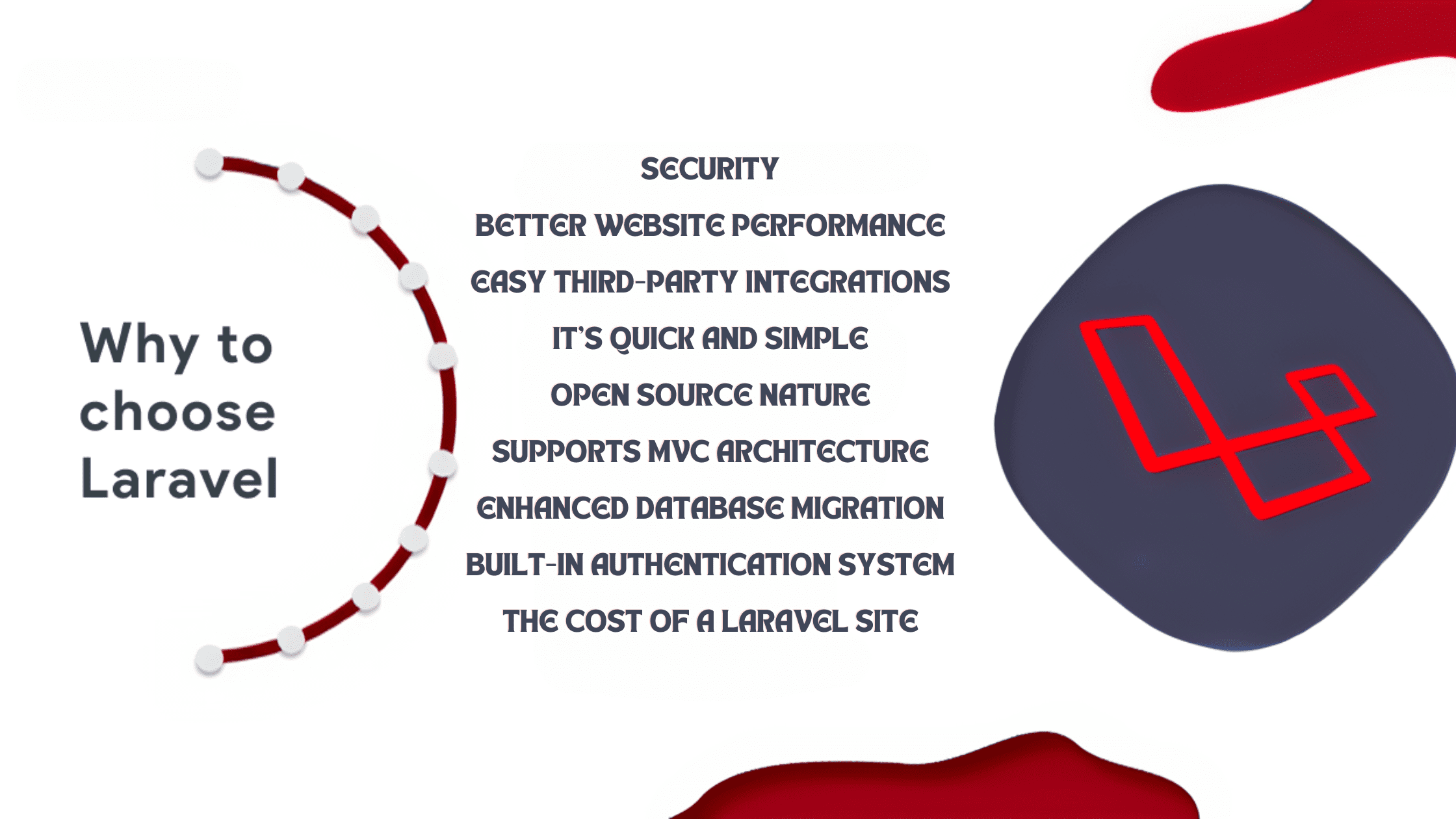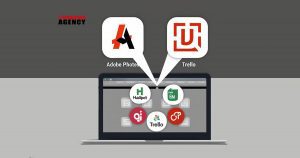Creating a business website is an impactful step that requires careful technology considerations. The framework behind your website significantly influences its capabilities and success. Laravel stands out as an exceptional choice in the complex web development landscape. Let’s explore why you choose a Laravel framework for your business website to build robust, scalable websites.
What is Laravel Development?
Laravel is a robust and elegant PHP web application framework that follows the Model-View-Controller (MVC) architectural paradigm. Laravel, developed by Taylor Otwell and initially made available in 2011, has become popular because of its expressive syntax, attractive features, and strong performance.
It offers a setting that simplifies routine web development processes, freeing up developers to concentrate on creating distinctive, feature-rich apps.
Features of Laravel Framework
Let’s examine some of the unique qualities that set Laravel apart before getting into the reasons why you should use it for your company website:
Elegant Syntax: The clean, expressive syntax of Laravel is well-known for making it simple for developers to build and manage code. The framework guarantees a consistent and readable codebase, which also promotes best practices.
Blade templating engine: One of the powerful yet lightweight methods of generating dynamic views is included in Laravel. Because of their intuitiveness, blade templates make it simple for developers to design intricate layouts.
Artisan Console: One of the command-line tools included with Laravel is called Artisan, and it simplifies routine operations like testing, seeding, and database migrations. It increases efficiency for developers by assisting them in automating tedious tasks.
Eloquent ORM: Eloquent ORM (Object-Relational Mapping) is a feature of Laravel that makes database interactions easier by letting developers work with databases using a natural syntax. Database operations are now more productive and developer-friendly as a result.
Laravel Mix: Laravel Mix makes asset management and compilation easier. It facilitates the easy compilation of assets like CSS and JavaScript by offering a clear and simple API for constructing Webpack build processes.
What is the purpose of Laravel?
Laravel is a flexible framework that may be applied to various web development tasks. Typical use cases consist of the following:
Web application development: Creating dynamic, feature-rich web apps is an excellent fit for Laravel. Because of its MVC architecture and robust technologies like Eloquent ORM, it is preferred for developers working on challenging projects.
Content Management Systems (CMS): Businesses may effectively manage and organize content by utilizing Laravel to design custom CMS systems. The framework is a great option for creating scalable CMS apps because of its extensible nature and modular structure.
E-commerce Platforms: Laravel offers a strong base for companies wishing to launch an online presence with e-commerce capabilities. Because of its adaptability and integration support, it may be used to create high-performing, bespoke e-commerce systems.
Enterprise Applications: Because of its scalability, security features, and capability for processing massive amounts of data, PHP is a popular choice for developing enterprise-level applications.
Why Choose Laravel Framework for Your Business Website?
Now, let’s delve into why using Laravel for your business website can be wise.
Security
Security is the top priority for any internet-based organization. Laravel integrates strong security capabilities to help protect your application and data, adopting a proactive approach to security. Among the crucial security elements are:
CSRF Protection: To defend against cross-site request forgery attacks, Laravel automatically creates distinct CSRF tokens for each active user session.
Hashing and Encryption: Laravel offers easy ways to hash and encrypt data, making sure that private information is kept safe.
Password Hashing: To improve the security of user passwords, the framework employs bcrypt, a one-way encryption technique.
Middleware: You can filter HTTP requests coming into your application with Laravel’s middleware capability. This is helpful for putting in place different security procedures, like authorization and authentication checks.
Laravel minimizes the risk of common web vulnerabilities by prioritizing security at its core, providing a secure foundation for your business website.
Better Website Performance
Search engine rankings and user experience are directly impacted by website performance. The architecture and features of Laravel improve performance in several ways:
Optimized Codebase: Laravel pushes programmers to create clear, effective code. Because of the expressive syntax and standards of the framework, the codebase is simplified, easier to maintain, and runs more quickly.
Effective Routing: Laravel’s routing system is made as effective as possible, enabling prompt and precise handling of incoming web requests. It leads to quicker response times and enhanced overall functionality of the website.
Caching: Laravel has built-in caching support, which can drastically speed up the retrieval of frequently requested data. Developers can improve application speed by caching views, routes, and database queries.
Faster websites boost customer happiness and have a favorable impact on search engine rankings, which is why Laravel is an excellent option for companies that value performance.
Easy Third-Party Integrations
Business websites frequently use APIs and third-party services to expand their functionality and add new features. The following are some ways that Laravel makes connecting these services easier:
Composer: Package management in Laravel is managed using Composer, a PHP dependency manager. As a result, Installing, updating, and managing third-party libraries and packages is made simpler.
Eloquent Relationships: The Eloquent ORM in Laravel offers a sophisticated method for defining and overseeing relationships between models. It makes retrieving and manipulating data easier and beneficial when interacting with databases or external APIs.
Service Providers: Services may be quickly registered and bound into the service container with the help of Laravel’s service providers. It facilitates the easy integration of external services and expands the capabilities of your application.
Laravel enables businesses to enhance their websites with the latest and most relevant features by facilitating smooth third-party integrations.
It’s Quick and Simple
Laravel is an excellent option for companies looking to publish their websites quickly because of its ease of use and simplicity, which help to accelerate the development cycle. Laravel makes the development process simpler in the following ways:
Artisan Commands: Laravel’s Artisan console offers a collection of commands for routine operations like seeding, testing, and database migrations. This automation shortens the time needed for repetitive procedures and speeds up development.
Convention Over Configuration: Laravel adheres to the idea of “convention over configuration,” meaning it has developer-friendly conventions and reasonable defaults. As a result, less extensive configuration is required, accelerating the development process.
Blade templating engine: The Blade templating engine in Laravel is user-friendly and makes it easy for developers to design dynamic views. As a result, frontend layouts and components are developed more quickly.
Laravel’s simplicity allows for a quicker time-to-market for companies working on time-sensitive projects without sacrificing the quality of the codebase.
Open Source Nature
The fact that Laravel is open-source is a big plus for companies. There are various advantages to the open-source model:
Support from the Community: Laravel has a sizable and vibrant developer community. This community helps to maintain constant updates, enhancements, and the accessibility of a wide range of resources, such as packages, forums, and tutorials.
Cost-effective: Laravel is open source, and no additional license costs exist. Because of its affordability, businesses can focus more effectively on developing and improving their websites rather than allocating resources elsewhere.
Continuous Improvement: It is possible to achieve ongoing improvement with the open-source methodology. The framework’s progress is fueled by developers worldwide, who ensure it keeps up with the newest trends and best practices in the industry.
For businesses, choosing an open-source framework like Laravel reduces costs and provides access to a wealth of shared knowledge and collaborative support.
Supports MVC Architecture
In many ways, businesses benefit from Laravel’s commitment to the Model-View-Controller (MVC) architectural pattern.
Modular Development: The Model, View, and Controller (MVC) paradigm divides the application logic into three interdependent parts. This division of responsibilities encourages modular development, facilitating code organization and maintenance.
Scalability: MVC’s modular nature makes scalable development possible. You can add more features and functionalities to your business website without breaking the current codebase as it expands.
Reusing Code: Since every component in MVC has a distinct function, it promotes code reuse. It promotes a more effective development process by lowering complexity and simplifying code reuse across various application components.
Laravel’s support for MVC architecture is critical to ensuring maintainability and flexibility for businesses building complex and scalable web applications.
Enhanced Database Migration
Laravel simplifies database management through its migration system, providing several benefits for businesses:
Database Version Management: Laravel’s migration mechanism enables database schema version management for developers. It enables the tracking and sharing of database schema modifications across development environments.
Simplified Schema Changes: Laravel’s migration mechanism simplifies database schema changes using straightforward, expressive PHP code. It guarantees consistency between many application instances and removes the need for manual database updates.
Database Seeding: Laravel supports database seeding, which lets developers add default or sample data to databases. It is beneficial while a project is being developed and tested.
As businesses change and modify their data structures over time, improved database migration capabilities help to make database management more structured and effective.
Built-in Authentication System
Security is a top priority for any business website, and Laravel simplifies the implementation of secure user authentication and authorization through its built-in features:
Pre-built Controllers and Views: For typical authentication operations like login, registration, and password reset, Laravel offers pre-built controllers and views. It drastically lowers the work needed to put these features into practice.
Authentication Scaffolding: With just one Artisan command, developers can create the required routes, controllers, and views in Laravel thanks to its authentication scaffolding. It guarantees a reliable and secure authentication mechanism while expediting the setup procedure.
Multi-Channel Authentication: This feature of Laravel enables users to log in using several accounts, including social media, email, and usernames. This adaptability improves the experience for the user.
Businesses can prioritize user accounts and sensitive data protection with Laravel because it has a solid and adaptable authentication system.
The Cost of a Laravel Site
Cost is a crucial consideration for businesses, and Laravel offers a cost-effective solution for web development:
No Licensing Fees: There are no licensing fees involved with the use of Laravel because it is an open-source framework. It is especially beneficial for companies who want to spend less money upfront and distribute resources more effectively.
Community Support: The vibrant Laravel community is a great place to get help in solving problems and exchanging knowledge. Companies can use community help for updates, troubleshooting, and learning about best practices.
Development Efficiency: A quicker development cycle is a result of Laravel’s optimized development process and automation tools, such as Artisan. For corporate websites, this efficiency means lower development costs and a faster time to market.
Laravel’s affordability makes it a desirable option for companies looking to strike a balance between budgetary constraints and top-notch development.
Laravel Pros and Cons for Web Development
While Laravel offers numerous advantages, it’s essential to consider both sides. Let’s explore the pros and cons of using Laravel for web development:
Pros:
- The clear and expressive syntax of Laravel improves the readability and maintainability of code.
- The active and vast Laravel community provides ongoing support, updates, and various resources.
- The built-in security features of Laravel aid in defending against frequent online vulnerabilities.
- Laravel’s modular design and MVC architecture allow it to be scaled for a variety of project sizes.
- Database operations become more efficient and developer-friendly when database interactions are simplified with Eloquent ORM.
Cons:
- For developers new to Laravel, there might be a learning curve due to the framework’s extensive features and conventions.
- While Laravel is optimized for performance, the framework may introduce some performance overhead compared to lightweight frameworks.
- In some cases, the framework’s conventions limit flexibility for developers who prefer more control over certain aspects of their applications.
Final Thoughts
Creating commerce-focused websites with customized digital experiences is essential for modern businesses. Laravel provides an agile development framework to construct fully-featured sites tailored to core business needs. Its versatile structure, security emphasis, and scalability also establish stable technical foundations for enterprises undergoing digital transformations. For web capabilities that convert visitors into long-term customers, Laravel delivers robust underlying website architecture.
With Canadian Software Agency as your go-to source for professional web development in Canada, you can transform your online presence! Our customized digital solutions will help you elevate your brand. All set for success? Reach out to us right now, and together, let’s bring your web vision to life!






